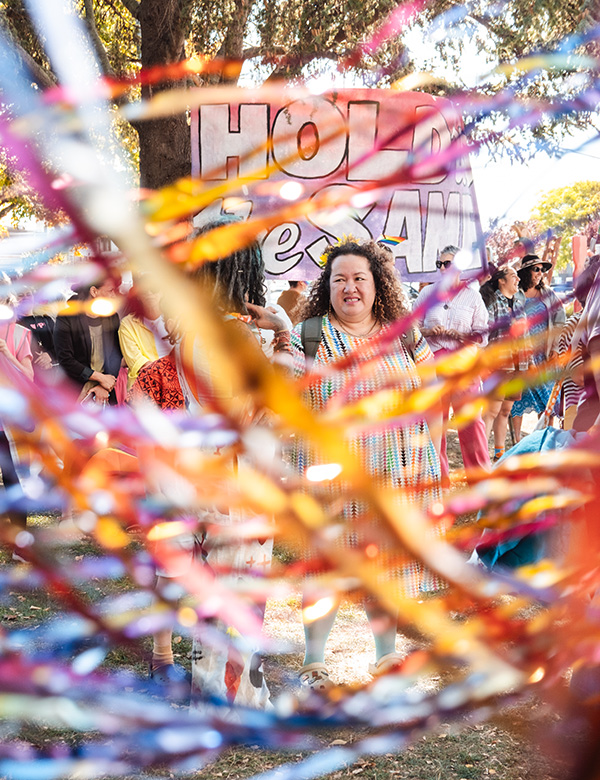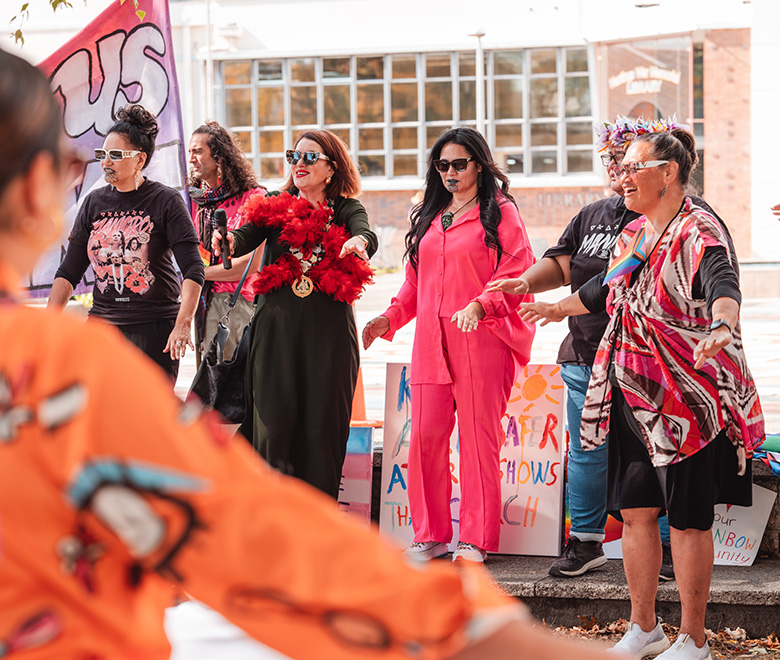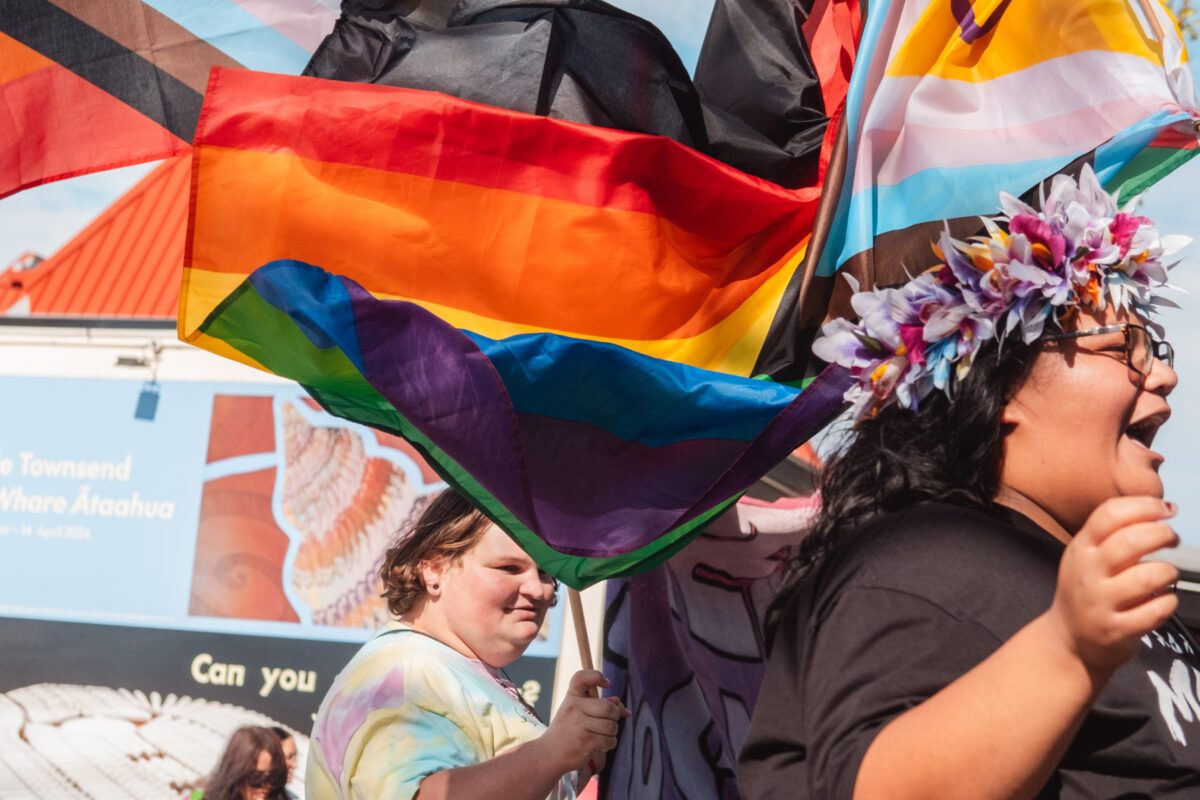[Published in May/June BayBuzz magazine. Updated 12 May.]
August 2020. Upstairs at Hastings Library is abuzz, kids and carers relishing in relative freedom.
A gathered bubble of mothers and our boys, then aged between eight and two, were eager for Rainbow Storytime, the brainchild of Erika and Coco Flash, a pair of Taranaki drag queens on tour. Dressed respectively in a floor length pink frilled evening gown and a sparkly rainbow caftan, they read aloud a selection of kids’ picture books such as Giraffes Can’t Dance and Chicken Divas, themed around believing in oneself and accepting difference in others. Then we all danced to the Birdie Song.
By the time they returned in 2022 my boys had aged out of being read to aloud, but the queens visited without incident.
Not so this year when they were due to pass through in late March. In the preceding weeks social media became aflame with outrage. The library disabled comments on the Facebook event.
Pentecostal megachurch, Destiny, took up the cause with zeal, organising a protest. Posters featuring the face of Wendy Schollum, the councillor most vocally in support of the event, captioned ‘Pro- Perversion’ were printed. Nevertheless Trust, a rainbow advocacy group, planned a counterprotest.
Until the day before the event, council was adamant to persist, but at the last minute cancelled citing safety concerns. Mayor Sandra Hazlehurst and Councillor Schollum made statements affirming Hastings District Council’s support for the rainbow community and their intention to celebrate Pride Month in June. Hazlehurst had received death threats, the first of her seven year career, and the event was pulled on police advice.
Community support
Social media’s outrage dial flipped from right to left. The counterprotest became a day-long ‘Love and Peace Action’ supported by Kahungunu and Council, who raised the rainbow flag above their building. Civic Square filled with a colourful representation of the rainbow community and their allies. Signs proclaiming, ‘Love Us the Same. Hold Us the Same,’ ‘Aroha not Hōhā,’and ‘Kids are safer at drag shows than they are at church’, mingled with pride flags. Tino rangatiratanga and Palestinian flags signalled other left leaning causes turned out in solidarity.
Teen drag queen, Eru Heke, performed a rousing routine to Lady Gaga’s Born this Way complete with cartwheels and splits. There was a free sausage sizzle, a co-creative painting corner and poetry; a lot of karaoke and a heavy police presence. Songs and performances, many from the recent Manioro festival, interspersed with speeches from members of the rainbow community and their allies.
Representatives of both Hastings and Napier Councils spoke, Mayor Hazlehurst’s voice thick with emotion. Several clergy from Hastings parishes stood in solidarity, keen to distance themselves from Destiny’s stance. A small ‘Man Up’ contingency observed for a time, helping themselves to sausages, before drifting away.
Paradoxically, Rainbow Storytime’s cancellation led to a much more public display of pride. Rather than being tucked away upstairs, queer people were singing and dancing in the street. Nevertheless Trust founder Shaqailia Uelese stresses the importance of visibility for her community in, “promoting inclusivity and diversity to enhance the mana of rainbow takatāpui peoples. It gives the wider community an opportunity to see and embrace us. We have our own events but mainstream events are so important because they reach a wider audience.”
Uelese founded Nevertheless in 2021 as a mental health advocacy group for Māori and Pacifica takatāpui youth. Last April they created Manioro Nu’u Rainbow Hub, supported by Hastings District Council and Te Taiwhenua. Twice a week they offer a safe space and kai for rangatahi. In the past year they have delivered over a hundred workshops and produced the Manioro festival. Their kaupapa, Uelese says, is to “disrupt shame with aroha”.
Destiny Church
Unconditional love is what Pastor of Hastings’ Iwi Tapu Destiny Church, Michael Ngahuku, claims to show all his congregation, regardless of sexual orientation or gender identity. He likens the queer community to gang members, both of which, he says, Destiny welcome despite their ‘choices’ – hate the sin, but love the sinner.
Ngahuku adopts a less confrontational style than Destiny leader, Brian Tamaki, who claimed natural disasters such as Cyclone Gabrielle, are caused by sin, including homosexuality, but Ngahuku does believe in a biblical wrathful god, and does not believe in climate change.
Despite not having seen Rainbow Storytime, he believes drag is ‘adult entertainment’, no matter the content. He objects to this use of ratepayer funds and claims Council are pursuing a personal agenda rather than reflecting the will of the people. He thinks “certain (members of the rainbow community) are pushing their beliefs into the public forum”, and that he voices a silent majority afraid to speak out.
That silent majority will have a chance to be counted in the privacy of the ballot box when Ngahuku stands in the Takitimu by-election, where he hopes to challenge his imagined Council agenda. He won 379 votes in the Tukituki electorate last year, or 0.009% of the vote – fewer than the 0.012% of spoiled votes. Voting in the by-election ends 24 May.
Promotional material for the proposed protest, circulated from Destiny headquarters, claims Rainbow Storytime is ‘sexualising children’. Ngahuku cites his church’s work counselling victims of sexual abuse. He alleges drag queen Erika Flash, played by Daniel Lockett, makes children vulnerable to abuse.
Evidence is produced in the form of a promotional video for a 2019 performance of Priscilla Queen of the Desert in New Plymouth, in which Lockett played Miss Understanding. Further stills of Lockett as Dr Frankenfurter in the M-rated Rocky Horror Show were used to prove his unsuitability.
Sunita Torrance, who plays CoCo Flash, pointed out the pair are professional actors who take on a myriad of roles in their career for a range of audiences, and accuses Destiny of bullying. They are police vetted and have Working with Children qualifications. A Give-a-Little for legal fees to “hold Destiny accountable for threats and defamation” raised $25,000 in a week.
Following Tamaki’s lead, Ngahuku will be taking legal action against Hastings District Council for “rainbow washing”, cementing his intention to be combative. He repeatedly charges the rainbow community with bullying, claiming the country “has been lost to the trans/gay ideology”, characterising queer activists as “demonic”.
Accusations of bullying, suppression of freedom of expression, bigotry and agenda pushing are flung across an increasingly polarised ideological divide. Rainbow Storytime has become a battleground in a culture war where everyone is shouting and no one is listening.

Media role
The way we got here has everything to do with the way we communicate and consume media. The internet was founded on libertarian principles – extreme freedom of speech, and, in its vastness, a degree of freedom from consequences. As social media slowly suffocates the fourth estate, in the information age, we are not the consumer but the product.
Algorithms reward conflict. Divisive opinions expressed in inflammatory terms stimulate engagement, resulting in a race to the bottom. We are served more of what is popular and what is popular is what sows division. Without the checks and balances of legacy media, sensationalism rises to the top of our news feed, while reasoned truth sinks into obscurity. Navigating the current media landscape is a minefield with technology moving faster than our capacity for critical thinking.
Winston Peters has been on a campaign against relationship and sexuality education. Much was made over a book, Welcome to Sex, that offers frank advice to teens. A University of Canterbury sex educator praised the book. Through a mixture of inflammatory misinformation and homophobic pearl clutching, a large cohort on social media have come to believe that 8 year olds are being taught the mechanics of anal sex in schools.
Even though the book is for teens, has never been a school text, and the guidelines on relationship and sexuality education have no mention of sex of any kind beyond the correct naming of body parts until intermediate, reasoned appeal falls on deaf ears compared with emotive outrage. Many scared parents are now campaigning to remove the education that will ultimately make all our children safer. The sad truth is that inadequate sex education has a direct correlation with sexual abuse, and children who are left uneducated will learn about sex through pornography.
The current moral panic around drag queens has its roots in obscure and lawless corners of the internet but has filtered into the mainstream. The conspiracy theory claims the world is run by a cabal of child sacrificing paedophiles who intend to depopulate the planet through a combination of vaccines, 5G and turning children transgender. It first appeared on message boards 4chan and 8chan, sites known for hosting child pornography, and is widely believed to be the invention of the owners of those boards, who profited from the engagement.
The theory relies heavily on tenuous connections and symbology, similar to the lines drawn between Lockett’s theatrical work and child abuse. As it makes its way to the mainstream some of its more outlandish edges are rubbed off, so aspects can end up being parroted by our loved ones, our community leaders and even some of our elected officials.

This is not the first time an imported moral panic has invaded Aotearoa.
Thirty years ago, satanic panic manifested in the persecution of Peter Ellis, a flamboyantly gay early childhood worker, who spent seven years in a Christchurch prison for crimes of which he was only posthumously acquitted. Ellis’ ‘sexual deviance’ was used as evidence, just as Lockett is framed as unsuitable to work with children today.
Proponents of a so-called transgender agenda prey on our fears for our children, while dehumanising those with different viewpoints. They are no longer people with different opinions and lifestyles to us, but demons intent on destroying us and our way of life.
Social media exacerbates divisions by emboldening people to speak in harsher tones than they would face to face. Behind the screen we so easily forget we are speaking to real people with thoughts and feelings.
Fears are stoked by a perceived explosion in gender nonconformity, with schools having to navigate issues of bathrooms and sports, as well as a mental health epidemic. Many young people are rejecting gender norms and openly identifying as nonbinary – neither male nor female – asking to change their names and pronouns – red rag to a bull for some. Critics accuse pride celebrations and events like Rainbow Storytime of forcing gender ideology on impressionable children. But these opinions and accusations are based on feelings, informed by our divisive media landscape that farms emotions for clicks.
Gender identity
The University of Auckland’s Adolescent Health Group has been monitoring youth wellbeing since the turn of the century across a broad range of areas. Their 2007 study found a need to ask teenagers not just about sexual orientation, as they had done previously, but about gender diversity. The next study, in 2012, found 1.2% identified as transgender and 2.5% as gender questioning. In 2019 these numbers had reduced to 1% transgender and .06% gender questioning; yet, crucially, in 2019 more than half had told someone about their gender identity compared with just a third in 2012.
This points to increased visibility of gender questioning youth rather than their numbers increasing. Like the perceived increase in homosexuality after decriminalisation, which plateaued rather than increasing exponentially, queer youth who have positive role models and feel safe to do so, are more likely to be out, proud and visible. In this both the right and left agree on the facts – that events such as Rainbow Storytime, and the normalisation of queerness will result in more diversity of gender and sexuality in the public eye.
Critics believe removing queer icons from public view will result in fewer queer people because they believe deviation from heteronormativity to be a choice – a sinful one to be overcome. However, the data shows there is a shrinking silent minority of LGBTQIA+ youth who choose suppression and conformity over embracing their identity.
Every available metric agrees that queer and gender nonconforming youth suffer significantly higher rates of bullying and have consistently worse mental health outcomes than the general population. They are more likely to be victims of a crime and less likely to report it. They experience more than double the rate of sexual violence.
A 2022 study, the first of its kind in Aotearoa, found youth whose whānau or religious leaders suggested they could or should attempt to change their sexual orientation or gender identity were at significantly higher risk of self-harm and almost three times as likely to attempt suicide than rainbow youth whose difference was accepted as an intrinsic, immutable part of them.
Clearly queer youth are some of our most vulnerable children, in need of protection. This has been reflected back to us consistently by science for decades. This is the data on which we base the relationship and sexuality education we provide in schools; the programmes our councils fund.
Creating a society in which our rainbow youth can be accepted rather than judged, bullied or gaslighted back into the closet requires investing in organisations such as Nevertheless Trust, who can provide safe spaces like Manioro Nu’u Rainbow Hub. But more than that, we need to examine and take responsibility for our own prejudices and fears, rather than projecting them onto those who are different to us, and perpetuating them through our children.
Since the publication of this article, Rainbow Storytime has been cancelled and Lockett has left the country. Torrence still intends to take legal action against Destiny Church and has raised more than $30,000. A Destiny Church campaign to raise funds for legal costs associated with their members’ vandalism of an Auckland rainbow crossing failed to reach its $8,000 goal, raising around 20% of what Rainbow Storytime achieved with a similar average donation amount.
Nevertheless Trust took a brief hiatus from activity, promising to ‘be back stronger and better for it‘.


Good afternoon,
I am writing to you concerning your latest issue of Baybuzz magazine. A brilliant magazine showcasing local Hawke’s Bay talent, news and local businesses. I relocated to the Hawke’s Bay a few years ago from Wellington and soon discovered this magazine and started a subscription. In saying all of that I was very disappointed to read the article titled ‘Rainbow Warriors; The fight for young hearts and minds’. Rainbow Warriors. Really? This article is written clearly from a one-sided (liberal) perspective and is full of misinformation. The gender ideology issue is fast becoming a real issue and talking point in New Zealand and so it should be. Countries like the US and UK are taking steps back tracking on their somewhat radical gender health interventions and New Zealand is very slow to catch on. The ‘journalist’ who wrote this piece is so misinformed and doesn’t actually state any research or facts and merely is just writing her opinions down.
A direct quote taken “The current moral panic around drag queens has its roots in obscure and lawless corners of the internet but has filtered into the mainstream”. Opinion based and not providing any basis for her argument. The whole article reads as an embarrassment.
How about providing some real research into this issue? There is a whole paragraph on Destiny Church and what they stand for and believe in. I myself aren’t a supporter of that church but it’s not just that church in Auckland who is concerned. There are many groups out there made up of concerned parents and caregivers who are opposing any gender grooming/indoctrination of children. Why not cover them in a story? Let Kids be Kids, Parents Against Gender Ideology, Kōrero Wahine. There is an uprising against both protecting the innocence of children and protecting woman’s spaces, why not cover that?
As you can see, this article is not only antagonistic but extremely divisive. I will be cancelling my subscription as I am not interested in supporting rubbish ‘journalism’ and reading articles like this is the future.
Jenny Hobson